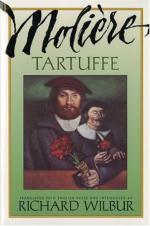|
This section contains 6,099 words (approx. 21 pages at 300 words per page) |

|
SOURCE: “Molière's Temporary Happy Endings,” in French Studies, Vol. XLV, No. 2, April, 1991, pp. 129-42.
In the following essay, Shaw examines Molière's use of comic denouements, contending that they suggest that real-life endings are not always happy.
Many would say that Molière's plays end happily. Tartuffe is arrested, Harpagon finds his money, Philaminte sees the error of her ways: the obstacle is removed, the lovers can marry, order is restored, the celebrations can commence. But this is not the whole picture. His plays do not all end on a note of unrestrained happiness. If the ending of Tartuffe anticipates the ‘doux hymen’ to come, George Dandin ends with talk of suicide. If Les Femmes savantes ends with the marriage of Clitandre and Henriette, Le Misanthrope ends with the separation of Alceste and Célimène. The pattern is not obvious.
It has been claimed that Moli...
|
This section contains 6,099 words (approx. 21 pages at 300 words per page) |

|


